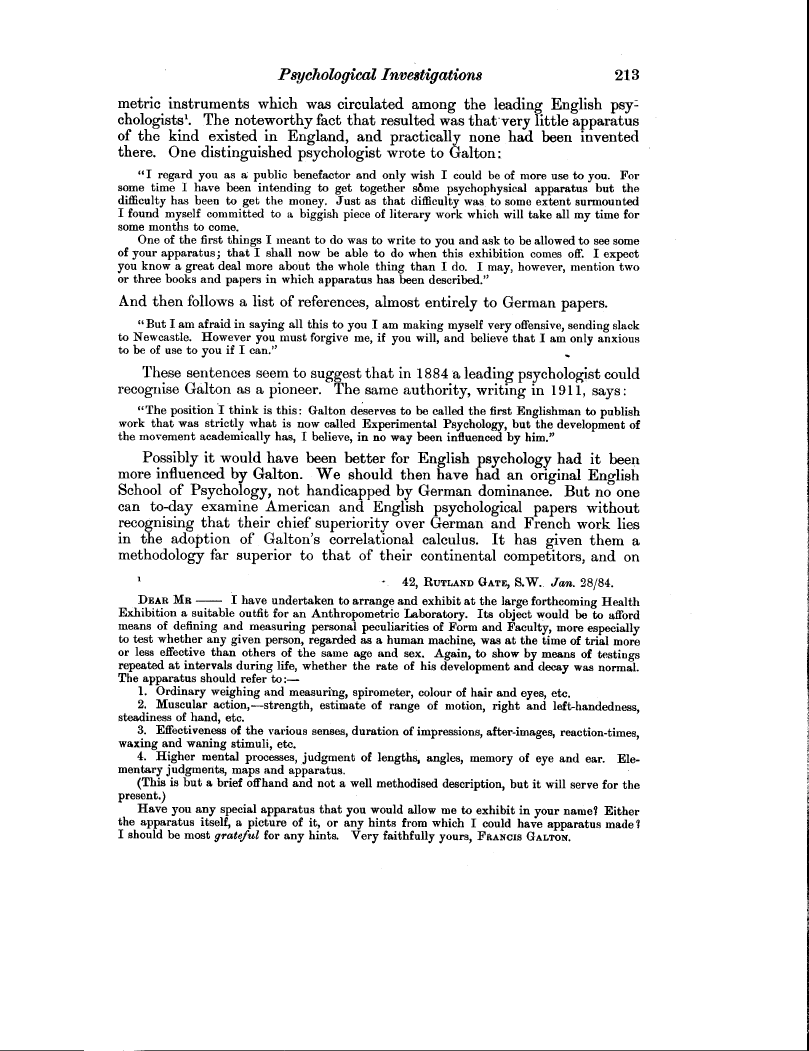Psychological Investigations 213
metric instruments which was circulated among the leading English psy-chologists'. The noteworthy fact that resulted was that-very little apparatus of the kind existed in England, and practically none had been invented there. One distinguished psychologist wrote to Galton:
"I regard you as a public benefactor and only wish I could be of more use to you. For some time I have been intending to get together some psychophysical apparatus but the difficulty has been to get the money. Just as that difficulty was to some extent surmounted I found myself committed to a biggish piece of literary work which will take all my time for some months to come.
One of the first things I meant to do was to write to you and ask to be allowed to see some of your apparatus; that I shall now be able to do when this exhibition comes off. I expect you know a great deal more about the whole thing than I do. I may, however, mention two or three books and papers in which apparatus has been described."
And then follows a list of references, almost entirely to German papers.
"But I am afraid in saying all this to you I am making myself very offensive, sending slack to Newcastle. However you must forgive me, if you will, and believe that I am only anxious to be of use to you if I can."
These sentences seem to suggest that in 1884a leading psychologist could recognise Galton as a pioneer. The same authority, writing in 1911, says
"The position I think is this: Galton deserves to be called the first Englishman to publish work that was strictly what is now called Experimental Psychology, but the development of the movement academically has, I believe, in no way been influenced by him."
Possibly it would have been better for English psychology had it been more influenced by Galton. We should then have had an original English School of Psychology, not handicapped by German dominance. But no one can to-day examine American and English psychological papers without recognising that their chief superiority over German and French work lies in the adoption of Galton's correlational calculus. It has given them a methodology far superior to that of their continental competitors, and on
1 42, RUTLAND GATE, S.W.. Jan. 28/84.
DEAR MR I have undertaken to arrange and exhibit at the large forthcoming Health Exhibition a suitable outfit for an Anthropometric Laboratory. Its object would be to afford means of defining and measuring personal peculiarities of Form and Faculty, more especially to test whether any given person, regarded as a human machine, was at the time of trial more or less effective than others of the same age and sex. Again, to show by means of testings repeated at intervals during life, whether the rate of his development and decay was normal. The apparatus should refer to:
1. Ordinary weighing and measuring, spirometer, colour of hair and eyes, etc.
2. Muscular action,-strength, estimate of range of motion, right and left-handedness, steadiness of hand, etc.
3. Effectiveness of the various senses, duration of impressions, after-images, reaction-times, waxing and waning stimuli, etc.
4. Higher mental processes, judgment of lengths, angles, memory of eye and ear. Elementary judgments, maps and apparatus.
(This is but a brief offhand and not a well methodised description, but it will serve for the present.)
Have you any special apparatus that you would allow me to exhibit in your name? Either the apparatus itself, a picture of it, or any hints from which I could have apparatus made? I should be most grateful for any hints. Very faithfully yours, FRANCIS GALTON.

